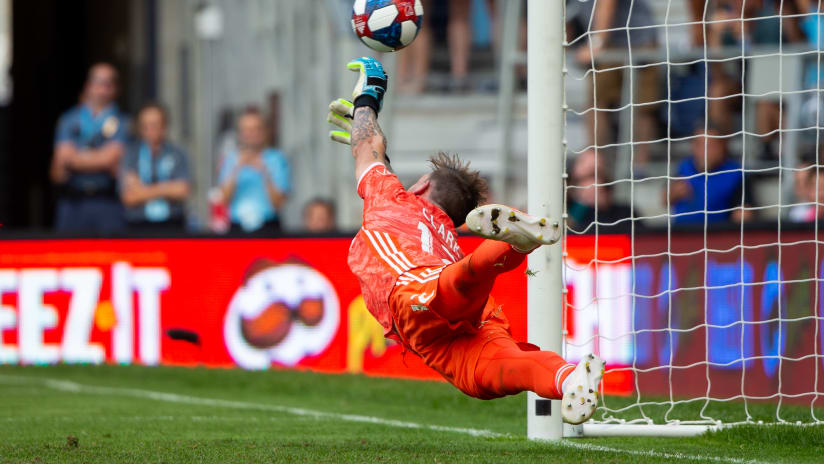Single moments define soccer matches less often than the cliché is used, but on Sunday in St. Paul, Minnesota, the saying was undoubtedly true. In a match that seemed destined to end 0-0, with the Portland Timbers and Minnesota United FC giving few hints they were able to change the score, a set of errant arms during a corner kick ended up swaying the match. When Ethan Finlay converted in the 92nd minute for the Loons, a game destined for a draw gave full points to the hosts.
What We’ll Remember most from Sunday’s game is less what happened than the questions around it. Why were Larrys Mabiala’s arms elevated to shoulder height, or above, on that late corner? Was he bumped, thrown off balance, sending his arms in the air? What unprecedented forces aligned to leave Mabiala with a technique we’ve never seen him use? How did that even happen?
Regardless of the whys, whats and hows, the moment defined the match – the prolonged, tension-filled moment that left replay after replay prompting the same question: Did the ball actually hit his arm or not? In real time, referee Chris Penso declined to whistle for a penalty. After the video review official recommended a second look, Penso changed course.
Steve Clark nearly saved his best defender, guessing correctly as Finlay aimed for the `keeper’s right post. But Clark’s hands weren’t strong enough, merely pushing the shot into the side netting as Finlay ran toward his supporters’ wall. Following a match defined by its lack of memories, one moment stood out.
The rest of the memories from Sunday’s game are a little forced, though in the future, when we think back to leg one in Minnesota, we may remember how the game felt defined the future, how it played out so similarly to the same situation a year ago, and how a couple of close calls went the Timbers way before Penso, after review, finally called time on the Timbers’ hopes.
The strength of the lineup
When the Timbers were drawn against United in the U.S. Open Cup semifinals, speculation turned to how head coach Giovanni Savarese would handle the task. Portland would be encamped in Minnesota for nearly a week, playing a Major League Soccer game three days before an Open Cup rematch. How would the Timbers manage their lineups?
If Sunday was any indication, the Timbers intend to play near-full strength teams in both games. Of the team’s normal, first-choice starters, only attacker Jeremy Ebobisse was out of the XI at kickoff, giving way to Marvin Loría. As was the case last week, when games against Orlando and Seattle were only separated by only two days, Savarese elected to use most of his first-choice players in game one. With no travel draining time between games, most regulars should be fully available for game two.
At least, that’s the theory. The team will know more tomorrow, as players start to recover, and even more on Tuesday, when it’s likely Portland will resume something akin to full training. If everything goes well, Wednesday’s team sheet should look very familiar.
The shadow of Open Cup
Whether the team’s approaches will look familiar, though, is another question. Much like last year, when the Timbers played Los Angeles FC in MLS before a quick turnaround to the teams’ Open Cup quarterfinal, game one of doubleheader felt like an exercise in restraint. both teams seemed to approach Sunday’s game wanting to win but without revealing their strongest cards. There was a wait-and-see approach that defined the first 91 minutes, with only close calls from Brian Fernandez (74th minute) and Mason Toye (85th) threatening to open the score.
Last year’s first leg in Los Angeles ended 0-0. Today’s game probably should have to, but in last year’s rematch, the teams delivered five goals. Expect more fireworks at Allianz Stadium in leg two.
The close calls with yellows
As much as the referee’s decisions in the match’s final moments will linger in our minds, a couple of non-calls may have allowed the Timbers to stay as close as they were, keeping two players carrying yellow cards on the field and eligible for the team’s next MLS game against Vancouver.
The first moment came in the 69th minute, when Diego Chara performed what ESPN’s Jon Champion colorfully referred to as a “rugby tackle.” Perhaps that was an exaggeration, but the heightened language was apt. Had he not already been carrying a yellow, the Timbers’ All-Star may have been sent off.
Minutes later, Julio Cascante was in a similar situation. Perhaps his sliding challenge on a Loons attacker wasn’t rugbyesque, but it was late, and he slid through the player. Penso had a clear view of the challenge and decided to let play continue, but as the ESPN crew noted, the play might have been carded under different circumstances. Penso’s leniency allowed Cascante to stay on.
It’s common for officials to give players on yellow cards a little extra leeway, and in trying to interpret what officials see, we spend too much time letting speculation drive our hopes. But in the mildest sense, those calls could have gone another way. And had the Timbers been reduced to 10, the match may have been defined by something other than Mabiala’s moment.












